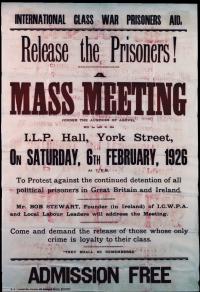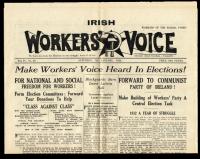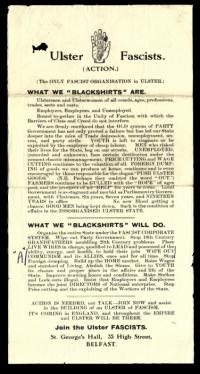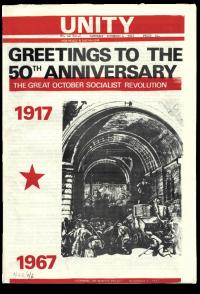‘Reds under the bed’: official attitudes to communism in Northern Ireland
Published in 20th-century / Contemporary History, Features, Issue 6 (Nov/Dec 2012), Northern Ireland 1920 - present, Volume 20
Poster calling for a mass meeting by International Class War Prisoners Aid, 1926. (PRONI)
‘He referred to the ruling class of the present day as a gang of money sharps, and warned them that, just as an omelette could not be made without breaking eggs, so socialism could not come about without hardship and discomfort to some of the wealthier people of the country’.
This statement did not, however, attract any attention from the RUC or the Ministry of Home Affairs.Other speakers were not so fortunate. File HA/32/1/598 (1933) contains documents regarding the prosecution of A. Griffin, who at a meeting of the Belfast branch of the Communist Party of Ireland on 24 September 1933 stated that he wished that ‘. . . we were in a position here in Ireland where our party could call upon the mass of workers with a great degree of confidence for the mass armed insurrection against capitalism’. A. Griffin was prosecuted under the Civil Authorities (Special Powers) Act (Northern Ireland) 1922 for ‘using language calculated to create discontent’ (Ministry of Home Affairs correspondence, 4 October 1933) and received three months’ imprisonment with hard labour.HA/32/1/565 (1940) contains documents on the prosecution of V. Morahan, who during meetings of the Communist Party of Ireland made anti-war statements that were considered to be ‘sailing very close to the wind’ (correspondence between the Ministry of Home Affairs and the RUC, 18 June 1940):
‘. . . we seek a way out of this war, a way out of this war which will bring us to the end of the system which was responsible for bringing it about. A way out of this war, on the road to Socialism, the only road which the working class in all countries will eventually go to maintain their rights and liberties which Fascism means to take away’(RUC report, p. 5, 27 May 1940).

Front page of the Irish Workers’ Voice, 7 January 1933. (PRONI)

Leaflet of the Ulster Fascists, 1934. (PRONI)
The Spanish Civil War
Following the coup in 1936 that ignited the Spanish Civil War, communist organisations in Northern Ireland began to discuss the situation at their meetings and to support the left-wing republican government in different ways. HA/32/1/558 (1936) contains RUC reports of the Spanish Medical Aid Relief Committee meetings (under the auspices of the Socialist Party of Northern Ireland). According to the RUC report of the meeting held on 4 October 1936 (which was attended by c. 200 people), it was ‘considered that the best way in which we could support the Spanish workers was to organise a medical outfit or a medical unit to serve behind the lines in the Spanish Civil War’.A medical outfit/unit had previously been discussed by the Relief Committee. In the RUC report of the 20 September 1936 meeting it was detailed that
‘The Scottish–Irish unit is made up of 18 Scotchmen and two Irishmen. The two Irishmen who left with the unit on Thursday are members of the Socialist Party of Northern Ireland. They gave up their jobs and volunteered to go to Spain to assist all those who have been wounded in the fighting there [as] they knew that the struggle in Spain was not the struggle of the Spanish workers but was the struggle of the working classes the world over.’
HA/32/1/559 contains RUC reports of the Arms for Spain Committee meetings (under the auspices of the Socialist Party and Left Book Club). At the meeting on 8 June 1938 (again attended by c. 200 people) it was reported that ‘The purpose of this meeting is to demand that the Republican government of Spain is allowed to buy arms’. The subsequent meeting on 25 July 1938 was reported to have been attended by c. 500 people, highlighting a potential increase in support for the Republican government of Spain.Finally, HA/32/1/560 (1937–40) contains RUC reports of the Northern Ireland Socialist Party meetings, where, for example, in September 1937 attendances of 700–800 people per meeting were recorded. Throughout the file the RUC reports contain information on Spanish Civil War issues and, later, World War II.
World War II
During World War II, monitoring and reporting of the communist organisations in Northern Ireland became of greater importance owing to the threat to internal security. Files HA/32/1/556 (1938–40) and HA/32/1/557 (1940–1) contain RUC reports on the Communist Party of Ireland and the Connolly Commemoration Committee that include details such as numbers attending, funds raised and the war-related topics discussed. In file HA/32/1/556, for example, the RUC report of the Communist Party of Ireland meeting (21 December 1939), referring to UK foreign policy, reports that ‘Every possible encouragement was given to Fascist Germany to rise to her present position. In 1935 the Anglo-German naval treaty was responsible for allowing Hitler to build up naval armaments to such a pitch that today we are seeing the fruits of that particular agreement.’Towards the end of the war, in 1944, Belfast celebrated ‘Red Army Day’ (MPS/2/3/453), along with other cities in the United Kingdom. This celebration included a march-past of the forces (fighting and civil) through the centre of Belfast and past City Hall. It was attended by USSR representatives and members of the civil defence and national fire services. This was within the wartime context where the Soviet Army had recently won a series of victories on the Eastern Front and was rapidly advancing westward.

Front cover of Unity, celebrating the 50th anniversary of the ‘Great October Socialist Revolution’, November 1967. (PRONI)
The Cold War
The European post-war period was different, however, being dominated by the Cold War. As in previous decades, the communist organisations were monitored and reported on by the RUC. For example, HA/32/1/938 (1950–61) contains information on members of the Communist Party and reports on British–Soviet Friendship Society visits to the USSR and Northern Ireland. This includes a pamphlet entitled Northern Ireland Teachers and Education in Russia (c. 1955). The PRONI also holds a file (HA/32/1/599A) on the Friends of the Soviet Union for the years 1933–64. Both files are partially opened and are available to view in the PRONI.The PRONI holds copies of the newspaper Unity from between 1962 and 1983 (N/26/1/1-22). The newspaper was published weekly by the Communist Party of Ireland and contains articles on the social and political events of the time, for example the 50th anniversary of the 1917 October Revolution (above), although in file HA/32/1/922 (1948) a letter dated 2 July 1948 from the Ministry of Home Affairs to the RUC notes that the last issue of Unity had been published in December 1946 and that ‘the executive members of the Communist Party are finding great difficulty in raising sufficient funds to re-publish’.All the files discussed above, unless specifically stated otherwise, are currently open and accessible to the public and may be viewed in the PRONI. Finally, I would like to thank the PRONI’s Deputy Keeper of the Records for permission to publish the above excerpts. HI
Alan W. Robertson is an archivist at the Public Record Office of Northern Ireland.
















